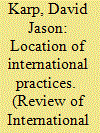|
|
|
Sort Order |
|
|
|
Items / Page
|
|
|
|
|
|
|
| Srl | Item |
| 1 |
ID:
175400


|
|
|
|
|
| Summary/Abstract |
This article uses snapshots, rather than the ongoing flows of diffusion/contestation typically emphasized by constructivists, to explore the exercise of power through normative change. Its case is a high-profile Human Rights Council initiative: the UN Guiding Principles on Business and Human Rights (UNGP s). These UNGP s have successfully presented meanings as fixed while actually stretching those meanings’ boundaries. They reconceptualize what it means to “respect” and “protect” human rights. This is surprising given that the principles were framed as a conservative exercise at clarification, and under-noticed due to the legal rather than conceptual focus of the existing critical literature. To respect human rights, according to the UNGP s, agents need to take costly positive action. Furthermore, protect obligations come before respect. These are significant innovations. On the other hand, two missed opportunities of the UNGP s are their thin harm-based foundation for respect obligations, and their state centrism about who has duties to protect.
|
|
|
|
|
|
|
|
|
|
|
|
|
|
|
|
| 2 |
ID:
123398


|
|
|
|
|
| Publication |
2013.
|
| Summary/Abstract |
This article opens up space to challenge state-centrism about human rights practice. To do so, it presents and critically assesses four methods that can be used to determine who and/or what counts as a part of any international practice: the agreement method, which locates a practice by referring to speech acts that define it; the contextual method, which locates a practice by referring to the actions, meanings, and intentions of practitioners; the value method, which locates a practice by identifying a value or principle that the practice reflects or instantiates; and the purpose method, which locates a practice by constructing an account of the sociopolitical reason(s) for a practice's existence. The purpose method, based on an interpretation of Rawls' constructivism, is developed, in a way that focuses on practitioners' judgement-based reasons to assign responsibility for human rights to any state or non-state actor.
|
|
|
|
|
|
|
|
|
|
|
|
|
|
|
|
| 3 |
ID:
086149


|
|
|
|
|
| Publication |
2008.
|
| Summary/Abstract |
This article applies E. H. Carr's analysis of utopia and reality, and a Searlean-constructivist analysis of rules and norms, to the concept of 'sovereignty' in general, and Stephen Krasner's argument in Sovereignty: Organized Hypocrisy in particular. In doing this, the article charts a theoretical space that incorporates insights from classical realism, scientific realism, and philosophical (social) constructivism. To view 'utopia' and 'reality' as distinct yet equally important planes of International Relations (IR) inquiry, thereby treating 'sovereignty' as a single concept with descriptive and normative elements, highlights both the merits and the shortcomings of Krasner's approach. Furthermore, this type of analysis suggests a fruitful way to continue a contemporary normative discussion about what sovereign entities ought to do.
|
|
|
|
|
|
|
|
|
|
|
|
|
|
|
|
|
|
|
|
|